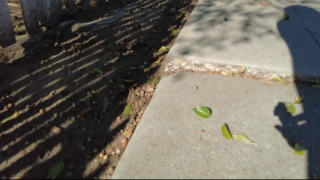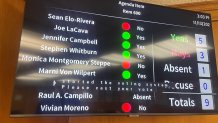
The San Diego City Council Monday voted to allow a permit fee waiver and expedited permit process for sidewalk repair permits through Fiscal Year 2026.
The action was intended to make sidewalk repairs easier for residents to "address (and) reduce the overall backlog of sidewalk repair locations and enhance public safety."
It authorizes use of city funds to waive property-owner sidewalk repair permit fees and pay for city of San Diego Transportation Department crews to perform sidewalk repairs in locations within a census tract that is "deemed eligible for Community Development Block Grant funds, in a Promise Zone, or located in a Community of Concern identified per the Climate Equity Index," a statement from the city read.
While the intent is to allow for historically underserved and underfunded parts of the city to have their sidewalks repaired, several council members expressed concerned as to whether there would be any money left to assist property owners in south and southeast San Diego.
Get top local stories in San Diego delivered to you every morning. >Sign up for NBC San Diego's News Headlines newsletter.
City Council President Sean Elo-Rivera joined Council President pro Tem Monica Montgomery Steppe and Councilwoman Vivian Moreno in expressing concerns about how equitably the program would work, and whether less affluent neighborhoods would get financial support to fix sidewalks.
The three comprised the three Nay votes on the item, which passed 5-3. Councilman Raul Campillo was absent from Monday's meeting.

Local
According to a staff report from the city, the permit fee waiver will save property owners $2,100 in fees and will speed up the permitting timeline.
San Diego has more than 4,550 miles of sidewalks, much of which were poured by private developers from the start of World War II through the 1970s. The average lifespan of a sidewalk is 50-70 years, and much of the city's pavement is much older.
"Over the past decade, legal claims related to sidewalk disrepair have cost the city an average of at least $46,000 per closed sidewalk-related claim, compared to an estimated cost of $6,600 to replace the average sidewalk location via a Capital Improvement Project," the city staff report reads. "Reducing the physical and legal hazards of damaged sidewalks is imperative."
Damage to sidewalks is commonly caused by tree roots uplifting portions, heat expansion, underground utilities and vehicle accidents.
According to the city, sidewalks can be repaired through permanent measures such as sidewalk slicing and replacement or temporarily mitigated through asphalt ramping. Asphalt ramping involves applying a patch of asphalt to an uplifted sidewalk to create a gradual ramp. Sidewalk slicing involves cutting sidewalk uplifts between 0.5 inch to 1.5 inches in height and creating a gradual ramp.
Both methods are intended to reduce the likelihood of trips and falls.
In Fiscal Year 2023, 1,968 locations were ramped with asphalt. The average response time was seven days, and the average backlog of locations was more than 50. City staff estimated the time for response will decrease to just one day with the expedited permit process passed Monday.
However, the city's transportation department has a list of more than 5,000 locations that are the responsibility of the private property owner. The permit fee being waived is intended to shorten that list considerably.



